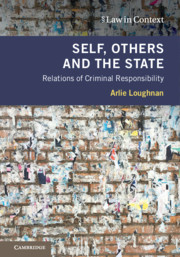‘This is a new and exciting addition to the burgeoning critical literature on criminal responsibility. Loughnan’s focus is on the ways that criminal responsibility is linked to, and organises, wider networks of social responsibilities. This novel approach allows us to see how the narrow question of criminal liability is underpinned and shaped by broader social and institutional framings of responsibilities, giving novel and important insights into what Loughnan calls the ‘social life’ of the criminal law. These new theoretical insights are developed through an account of the development of criminal responsibility in twentieth-century Australia. This is an important new book and should be essential reading for anyone interested in the history and theory of the criminal law.’
Lindsay Farmer - University of Glasgow
‘Responsibility has in recent years become a central preoccupation for criminal lawyers, theorists and historians. Arlie Loughnan’s new book nonetheless brings truly fresh things to the … existing debate. In its striking analysis of the differing relations between self, other and the state which underlie responsibility practices, Loughnan shows that … important and contextually significant differences subsist, with certain subjects - women, groups, the state itself - constituted in terms of non-standard forms of responsibility. The book is an important contribution not only to socio-historical and criminal law theory but also to the feminist and post-colonial analysis and critique of law.’
Nicola Lacey - London School of Economics and Political Science
‘Arlie Loughnan’s new monograph, Self, Others and the State offers a well-researched, wide ranging, scholarly critique of the dominant criminal legal story about criminal responsibility … This is a very well-written monograph that is enjoyable to read. The argument that criminal responsibility organises relations between self, others and the state is valuable and insightful.’
Penny Crofts
Source: Journal of Legal Philosophy
‘Arlie Loughnan’s Self, Others and the State is an important and fundamental analysis of criminal law: how its thinking has been shaped, its principles established, its organization created and justified and the role of criminal responsibility in each of these dimensions of the discipline. It offers a direct and effective challenge to the prevailing scholarship.’
Ngaire Naffine
Source: Journal of Legal Philosophy



